|
|
|
Sort Order |
|
|
|
Items / Page
|
|
|
|
|
|
|
| Srl | Item |
| 1 |
ID:
149284
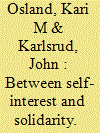

|
|
|
|
|
| Summary/Abstract |
Norway has been a firm supporter of, and contributor to, UN peacekeeping operations. However, while increasing its financial support since the end of the Cold War, Norway has significantly downscaled its troop contributions to the UN, focusing on NATO operations. Rather than interpreting this as lessened interest in the UN, we point out that support and commitment cannot be measured solely in numbers of troops deployed. Norway’s commitment to UN peacekeeping should be understood as part of its strategic culture, here read as a synthesis between self-interest and solidarity, and between the UN and NATO. This article details the institutional, political and material challenges and opportunities for renewed engagement in UN peacekeeping.
|
|
|
|
|
|
|
|
|
|
|
|
|
|
|
|
| 2 |
ID:
148982
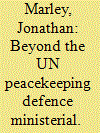

|
|
|
|
|
| Summary/Abstract |
After a period of declining contributions, there are signs of a renewed UK interest in UN peacekeeping missions. In this article, Jonathan Marley examines the factors that are driving the UK’s current approach. While London may be seeking a greater role in UN missions, to act effectively it will need to signal its intent to international partners and update its practices.
|
|
|
|
|
|
|
|
|
|
|
|
|
|
|
|
| 3 |
ID:
124983
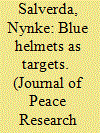

|
|
|
|
|
| Publication |
2013.
|
| Summary/Abstract |
A majority of UN peacekeeping operations deployed to civil wars face violent attacks by rebel groups. To date, the academic study of this type of violence has been very limited. This article is a first attempt to fill this gap. In particular, I aim to examine why rebel groups fight against peacekeepers in some cases, while not in others. I argue that since peacekeepers are mostly impartial but not neutral, they become an actor in a conflict and tend to protect the weaker side from total defeat. This implies that on the one hand, relatively weaker rebels will seek protection from the government by peacekeepers. On the other hand, relatively stronger rebels will challenge the peacekeepers in order to restrict their behavior and/or make them withdraw. If stronger rebels are successful in targeting the peacekeepers and the peacekeepers withdraw or alter their behavior, a victory for these rebel groups should become easier. Using novel data on violence against UN peacekeepers, I find that indeed, stronger rebel groups are more likely to fight against peacekeepers.
|
|
|
|
|
|
|
|
|
|
|
|
|
|
|
|
| 4 |
ID:
173890
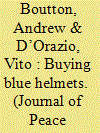

|
|
|
|
|
| Summary/Abstract |
While the evolving nature and proliferation of UN peacekeeping operations in the post-Cold War period is well documented, we know less about how personnel are recruited for these missions. Furthermore, recent developments have rendered existing supply-side explanations for troop contributions less convincing. The increasing demand for personnel, along with stagnant UN reimbursement rates and the rising costs of participation that began during the 1990s, mean that it is less attractive than ever for developing countries to offer their own troops to what have become increasingly ambitious operations. Yet, we see a large pool of developing countries continuing to do so. To address this puzzle, we argue that UN member states with strong preferences for establishing peacekeeping missions have begun using foreign aid as an inducement to help potential contributors overcome the collective action problem inherent in multilateral peacekeeping operations. We uncover strong empirical evidence that these ‘pivotal states’ strategically allocate foreign aid to persuade contributing states to boost their contributions, and also to ensure that these missions continue to be staffed and maintained as costs rise, particularly during the post-1999 period. We also find that states are responsive to these financial inducements: foreign aid increases both the likelihood of contributing personnel and the size of a state’s contribution. Theoretically, this article advances the scholarly understanding of international organizations and cooperation by illuminating an informal, extra-organizational strategy by which IOs can facilitate cooperation.
|
|
|
|
|
|
|
|
|
|
|
|
|
|
|
|
| 5 |
ID:
067543
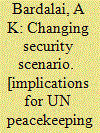

|
|
|
|
|
| Publication |
New Delhi, Knowledge world, 2006.
|
| Description |
xvi, 212p.
|
| Standard Number |
8187966386
|
|
|
|
|
|
|
|
|
|
|
|
Copies: C:1/I:0,R:0,Q:0
Circulation
| Accession# | Call# | Current Location | Status | Policy | Location |
| 050539 | 341.584/BAR 050539 | Main | On Shelf | General | |
|
|
|
|
| 6 |
ID:
108075
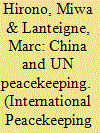

|
|
|
|
|
| Publication |
2011.
|
| Summary/Abstract |
After many decades of eschewing participation in UN peacekeeping missions, the People's Republic of China has since the 1990s rapidly reversed its critical stance and become an enthusiastic supporter of and contributor to several different types of UN missions including, some that have involved non-traditional peacekeeping. Evolving Chinese peacekeeping policy has suggested that despite the country's widely acknowledged rise to great-power status, within UN peacekeeping it still takes on the role of a middle power in its preferences for multilateralism and 'norm-taking'. Although China has stated that it wishes to continue its deep engagement in UN peacekeeping within its established norms for the near future, its presence as a rising power has prompted much new debate on how the country will tacitly and directly shape peacekeeping policy.
|
|
|
|
|
|
|
|
|
|
|
|
|
|
|
|
| 7 |
ID:
124742
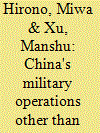

|
|
|
|
|
| Publication |
2013.
|
| Summary/Abstract |
Although political friction and ideological differences between China and the West can hamper co-operation on missions known as 'Military Operations Other than War', the UK and China have achieved a certain level of success in this regard, particularly in relation to UN peacekeeping and counter-piracy operations. In this article, Miwa Hirono and Manshu Xu argue that the key has been to use multilateral platforms to frame bilateral collaboration, thereby diminishing Chinese perceptions of the associated political risks. Thus it is useful for Western militaries to exploit multilateralism to make military co-operation more attractive to China.
|
|
|
|
|
|
|
|
|
|
|
|
|
|
|
|
| 8 |
ID:
174762
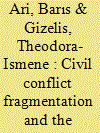

|
|
|
|
|
| Summary/Abstract |
While the extant literature has highlighted the importance of UN peacekeeping operations (PKOs) in addressing commitment problems in civil wars, actor fragmentation presents additional challenges for conflict resolution. A higher number of competing actors not only worsens coordination problems but also aggravates the risk of opposition to a peace process, generating an environment prone to spoiler violence. This article argues that UN interventions matter more when commitment and coordination problems are worse, which corresponds to known traits of fragmented conflicts. Using data on civil conflict duration and intensity, we present evidence that UN PKOs are effective at mitigating adverse impacts of fragmentation. Fragmented conflicts are both longer and deadlier when the UN is not involved to support a peace process, while UN peacekeeping mitigates the effects of fragmentation.
|
|
|
|
|
|
|
|
|
|
|
|
|
|
|
|
| 9 |
ID:
165432


|
|
|
|
|
| Summary/Abstract |
How do peacekeepers operating in Haiti, Liberia, and the Democratic Republic of the Congo (DRC) discursively construct the local people, especially local women, and to what effect? I show a connection between peacekeepers’ representations of local people, articulated in discourse, and the gendered, often sexualized interactions and transactions in peacekeeping sites. Gender plays a central role in peacekeeper discourse. It situates the peacekeeper outside, and superior to, the chaotic, dysfunctional, feminized local. At the same time, a close reading of peacekeepers’ representations of local people disrupts idealized notions of peacekeeper masculinity as protective and benign, which still persist in peacekeeping circles, revealing it as something more vulnerable and brittle. The connection between discourse and (non)performance of peacekeeping duties is neither causal nor straightforward, but I argue that peacekeepers’ discursive constructions of locals affect how peacekeepers interpret their mandate to protect civilians: protection becomes conditional on peacekeepers’ perceptions of locals’ appearance, affect, behavior, and their ability to act out an idealized role as someone “worth” protecting. The article thus brings new insight to our understandings of gender, masculinities, and protection failures in peacekeeping.
|
|
|
|
|
|
|
|
|
|
|
|
|
|
|
|
| 10 |
ID:
142280
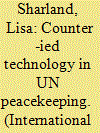

|
|
|
|
|
| Summary/Abstract |
Improvised explosive devices (IEDs) pose a significant threat to UN peacekeepers. This article argues that the UN needs to draw on the lessons from multinational engagements such as Afghanistan to identify, generate and deploy counter-IED technology to UN peacekeeping operations in a more systematic manner. It examines lessons emerging from the application of counter-IED technology in past multinational operations in order to identify areas to expand capabilities and mitigate risks in addressing the threat in the context of UN peacekeeping operations. First, it examines the evolving nature of the IED threat. Second, it surveys some of the lessons emerging from the use of technology in multinational engagements such as the NATO International Security Assistance Force in Afghanistan. Third, it explains some of the approaches already in place in UN peacekeeping operations. Fourth, it identifies potential challenges and limitations to employing more technology solutions to counter IEDs in UN peacekeeping missions, offering some thoughts on areas requiring broader reform to address the growing IED threat in UN peacekeeping missions. It concludes that technology can improve force protection, intelligence and the medical support available to peacekeeping missions to prevent and mitigate the effect of IEDs, thereby strengthening the safety and security of peacekeeping personnel, enhancing mission mobility, and improving the effectiveness of mandate implementation when it comes to the protection of civilians and early peacebuilding efforts.
|
|
|
|
|
|
|
|
|
|
|
|
|
|
|
|
| 11 |
ID:
092046
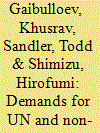

|
|
|
|
|
| Publication |
2009.
|
| Summary/Abstract |
This article presents alternative estimates for the demand for UN and non-UN peacekeeping. Generally, three-way fixed-effects models, which account for the country, year, and conflict region, provide the best estimates. The demand for UN peacekeeping is primarily influenced by the contributions of other nations (i.e., spillins), with spillin elasticity not significantly different from 1. For non-UN peacekeeping, both spillins and country-specific interests in the conflict region influence contributions. These peacekeepers' interests include trade and FDI concerns, along with proximity to the conflict. Peacekeeping missions appear partitioned: UN missions for global public benefits and non-UN missions for peacekeeper-specific benefits.
|
|
|
|
|
|
|
|
|
|
|
|
|
|
|
|
| 12 |
ID:
149282
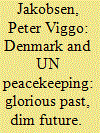

|
|
|
|
|
| Summary/Abstract |
Denmark became a staunch supporter of UN peacekeeping during the cold war because it simultaneously served its interests and values and this winning combination meant that it relatively quickly became internalized as part of Denmark’s foreign policy identity. Denmark turned its back on UN peacekeeping when NATO took over from the UN in Bosnia in 1995. Since then Denmark has prioritized NATO- and US-led operations. The Danish shift was driven by the interest in supporting the Western great powers as well as an altruistic desire to improve United Nations Protection Force’s (UNPROFOR) dismal humanitarian record in Bosnia. This belief was also generated by the positive lessons learned from Denmark’s pioneering use of tanks in UNPROFOR. This tank deployment and subsequent participation in NATO and US-led missions created a new warrior identity. This identity and the Danish interest in maintaining a close relationship to NATO’s great powers make a major Danish return to UN peacekeeping unlikely.
|
|
|
|
|
|
|
|
|
|
|
|
|
|
|
|
| 13 |
ID:
145595
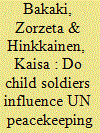

|
|
|
|
|
| Summary/Abstract |
The use of child soldiers in conflicts has received increasing academic attention in recent years. This article examines post-conflict periods to see whether the use of child soldiers mobilizes United Nations peacekeeping operations (UN PKO) in the aftermath of a conflict. Taking into consideration how child soldiers affect conflict and how important their reintegration is to sustainable peace and post-conflict development, we analyse whether the presence of child soldiers in a civil war increases the likelihood of the presence of a PKO. We argue that the UN deems a conflict with child soldiers as a difficult case for conflict resolution, necessitating a response from the international community. This is in line with our empirical results confirming that the use of child soldiers significantly increases the likelihood of peacekeeping.
|
|
|
|
|
|
|
|
|
|
|
|
|
|
|
|
| 14 |
ID:
149280
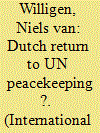

|
|
|
|
|
| Summary/Abstract |
This article covers the Dutch role in UN peacekeeping. The Netherlands has a long tradition of political and military involvement in UN peacekeeping. Like other European countries, its participation decreased considerably from the end of the 1990s onwards. The Dutch only ‘returned’ in 2014 when they delivered a substantial number of troops for the United Nations Multidimensional Integrated Stabilization Mission in Mali (MINUSMA) in Mali. This article starts with putting Dutch participation in UN peacekeeping into an historical context. It continues with an analysis of the reasons for withdrawal and subsequently explores the obstacles and opportunities for a structural return. The article argues that the decision to participate in MINUSMA is mainly explained by national interests and domestic factors. More in particular, government coalition politics explains why the Netherlands sent troops to Mali. In that sense, the Dutch ‘return to UN peacekeeping’ was not part of a structural change in policy-making, but depended for a large part on domestic political dynamics.
|
|
|
|
|
|
|
|
|
|
|
|
|
|
|
|
| 15 |
ID:
149281
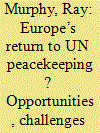

|
|
|
|
|
| Summary/Abstract |
This paper argues that Ireland has been a consistent contributor to peacekeeping since 1958 and examines how the nature of Irish participation has evolved. The maintenance of an effective UN forms a key objective of Irish foreign policy within which peacekeeping and a policy of military neutrality have come to play a central role. In 1993, Ireland revised the legal basis for participation. This brought about a fundamental change in policy, after which participation in peacekeeping not specifically of a police nature was permitted. Ireland displays evidence of both self-interest and altruism in relation to peacekeeping. Unlike many other European countries, it did not ‘withdraw’ from engagement during the 1990s. Despite greater clarity around decision-making processes in recent years, it is still difficult to discern a clear Irish policy strategy. Challenges identified for the future include the changing nature of UN peacekeeping, budget limitations and downsizing of the Defence Forces, legal obstacles to participation in non-UN approved missions, risk assessment, national caveats and a lack of clear doctrine.
|
|
|
|
|
|
|
|
|
|
|
|
|
|
|
|
| 16 |
ID:
131008
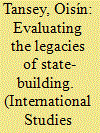

|
|
|
|
|
| Publication |
2014.
|
| Summary/Abstract |
What impact do international state-building missions have on the domestic politics of states they seek to build, and how can we measure this impact with confidence? This article seeks to address these questions and challenge some existing approaches that often appear to assume that state-builders leave lasting legacies rather than demonstrating such influence with the use of carefully chosen empirical evidence. Too often, domestic conditions that follow in the wake of international state-building are assumed to follow as a result of international intervention, usually due to insufficient attention to the causal processes that link international actions to domestic outcomes. The article calls for greater appreciation of the methodological challenges to establishing causal inferences regarding the legacies of state-building and identifies three qualitative methodological strategies-process tracing, counterfactual analysis, and the use of control cases-that can be used to improve confidence in causal claims about state-building legacies. The article concludes with a case study of international state-building in East Timor, highlighting several flaws of existing evaluations of the United Nations' role in East Timor and identifying the critical role that domestic actors play even in the context of authoritative international intervention.
|
|
|
|
|
|
|
|
|
|
|
|
|
|
|
|
| 17 |
ID:
013318
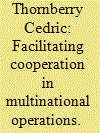

|
|
|
|
|
| Publication |
Dec 1997.
|
| Description |
31-35
|
|
|
|
|
|
|
|
|
|
|
|
|
|
|
|
| 18 |
ID:
149276
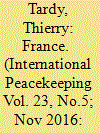

|
|
|
|
|
| Summary/Abstract |
French policy towards UN peacekeeping reflects the ambivalence of what France wants to achieve in the field of conflict management and through which institutional frameworks it prefers to work. On the one hand, France is greatly involved in the design and decision-making process of contemporary UN-led peacekeeping operations. On the other hand, after having been present in the field during the early 1990s, France underwent a major policy shift that led it to distance itself from UN operations. This chapter offers a narrative of French policy and perceptions vis-à-vis the virtues and limits of UN peacekeeping operations in the twenty-first century. It examines the French level of contributions, decision-making process, motivations and lessons learnt from past and current operations. It also analyses the dichotomy between the political role that France plays at the Security Council and its absence from UN-led operations. It seeks to determine how coherent this dichotomy is, its rationale, and how likely – and under what conditions – it will change in the near future, in particular through a hypothetical French return to UN-led peacekeeping operations.
|
|
|
|
|
|
|
|
|
|
|
|
|
|
|
|
| 19 |
ID:
180371
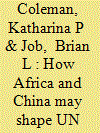

|
|
|
|
|
| Summary/Abstract |
UN peacekeeping became a flagship activity of the liberal international order (LIO) in the post-Cold War era, characterized by globalization, liberal norms and western leadership. Western states' diminished support for LIO UN peacekeeping has left it increasingly open to challenge, but significant changes are only likely if a strong group of states coalesces around an alternative model of UN peacekeeping. This article highlights African actors and China as well positioned to play pivotal roles in such a coalition. African states, who host the preponderance of UN missions and furnish almost half of the UN's uniformed peacekeepers, support globalized UN peacekeeping, show relatively weak support for the most liberal peacebuilding principles and assert the need for African-led solutions to continental crises. China's influence reflects its P5 status, financial and personnel contributions to UN peacekeeping and engagement with regional actors, notably in Africa. Aspiring to global leadership and a ‘new world order’, China endorses globalized UN peacekeeping but proposes a non-liberal (and non-western led) notion of ‘developmental peace’ to guide it. The complementarities between African and Chinese priorities raise the possibility of a profound challenge to LIO peacekeeping. Rather than heralding deglobalization, however, this challenge illustrates that post-LIO international institutions may instead be characterized by deliberalization and dewesternization.
|
|
|
|
|
|
|
|
|
|
|
|
|
|
|
|
| 20 |
ID:
177855
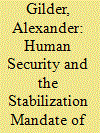

|
|
|
|
|
| Summary/Abstract |
This article looks narrowly at whether a ‘human security’ approach can be seen in a UN peace operation that pursues stabilization, namely the United Nations Multidimensional Integrated Stabilization Mission in the Central African Republic (MINUSCA). The UN’s interpretation of stabilization has not been expressly set out, but stabilization missions typically work alongside the host state to extend state authority and use robust force to counter spoilers. Human security is a concept which is rights-based, promotes the ‘vital core’, has a concern for vulnerability, utilizes preventative protection methods, and empowers local persons to have agency in the peace process. Attempts have been made to institutionalize and mainstream human security practices within the UN. An analytical framework of human security is outlined in this article and used to assess to what extent the mandate of MINUSCA pursues human security-based goals. An extensive review of UN documentation looks at the mandate and practice of MINUSCA and it is argued that the mission does seek to empower local people, engage in a bottom-up manner and entrench the rule of law. The analytical framework also casts light on aspects of the stabilization mandate which are problematic such as militarization and cooperation with the host state.
|
|
|
|
|
|
|
|
|
|
|
|
|
|
|
|
|
|
|
|
|